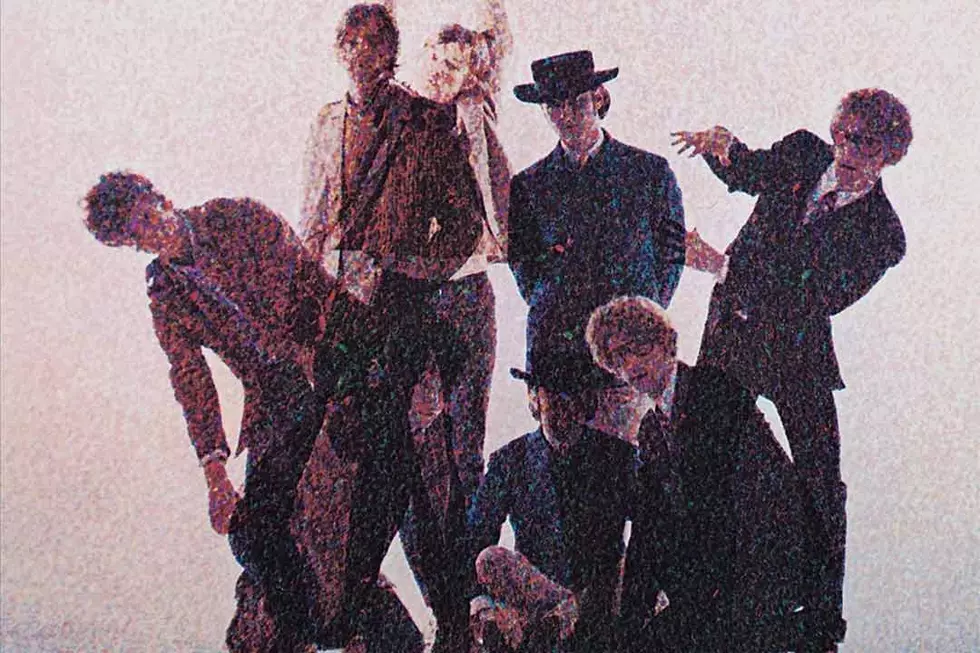
How the Byrds Went Psychedelic on ‘Fifth Dimension’
Much of Fifth Dimension, the Byrds' third album, was recorded after singer-songwriter Gene Clark left the band. Released July 18, 1966, Fifth Dimension helped introduce fans to psychedelic rock. Critical reviews were mixed but the album demonstrated the Byrds' evolution from folk-rock to a more experimental style.
"Eight Miles High" was the album's first single, a collaborative effort between Clark, David Crosby and Roger McGuinn, then known as Jim. "The previous year, 1965, we’d been on a trip to England," McGuinn told the Guardian in 2014. "It was our first time on a plane, and I had the idea of writing a song about it. Gene asked: 'How high do you think that plane was flying?' I thought about seven miles, but the Beatles had a song called 'Eight Days a Week,' so we changed it to 'Eight Miles High' because we thought that would be cooler."
"Eight Miles High" featured guitar work inspired by sitarist Ravi Shankar. The belief that 'Eight Miles High' was about drug use had it banned by some radio stations. "'Eight Miles High' has been called the first psychedelic record," McGuinn said. "It’s true we’d been experimenting with LSD, and the title does contain the word 'high,' so if people want to say that, that’s great."
Crosby, meanwhile, said "of course 'Eight Miles High' was a drug song. It does refer to the altitude of that flight, but it was a deliberate double entendre."
McGuinn's mystical lyrics on "5D (Fifth Dimension)," the LP's second single, signaled to some that it was also a drug song. McGuinn explained its deeper meaning. "What I'm talking about is the whole universe, the fifth dimension, which is height, width, depth, time and something else," McGuinn told Hit Parader. "The fifth dimension is the threshold of scientific knowledge. See, there are people walking around practicing fifth-dimensional ways of life and the scientists are still on two- or three-dimensional levels. There's a conflict there. A lot of our world is very materialistic and scientific. It overlooks the beauty of the universe. That's what the song is about."
Listen to the Byrds Perform 'Eight Miles High'
"Mr. Spaceman," the album's last single, was written by McGuinn as a tongue-in-cheek attempt to contact any extraterrestrials who might be in the neighborhood. "I'm interested in astronomy and the possibility of connecting with extraterrestrial life and I thought it might work the other way round, if we tried to contact them," McGuinn told ZigZag. "I thought that the song being played on the air might be a way of getting through to them."
"Captain Soul" was a rare instrumental by the Byrds, the result of an in-studio jam between sessions. In The Byrds: Timeless Flight Revisited, McGuinn attributed the idea to drummer Michael Clarke. "It wasn't really funky but it was interesting. Essentially, it was Mike Clarke's trip. He wanted us to do something soul-oriented, so we did that for him."
Other originals include Crosby's "What's Happening?!?!," McGuinn's "2-4-2 Fox Trot (The Lear Jet Song)," which incorporates the sound of a jet engine and a pilot's cockpit communication, and "I See You," a Crosby-McGuinn composition. "That's an early sessions, bubblegum type of song," McGuinn told Musicangle. "I did like the jazzy kind of feel to it. I'd been playing around with that jazz-, Coltrane-type of influence. It kinda seeped into everything I did at that point."
Fifth Dimension featured a cover of Billy Roberts' "Hey Joe (Where You Gonna Go)" and "I Come and Stand at Every Door," an adaptation of a Nazim Hikmet poem about the bombing of Hiroshima. The band's folk-rock roots are evident in McGuinn's adaptations of traditional songs "John Riley" and "Wild Mountain Thyme." Notable was the absence of any Bob Dylan songs on a Byrds' album for the first time. "Perhaps we were consciously trying to get away from it," McGuinn later reflected. "I guess we were trying to show Dylan we didn't need him. But that was a mistake because his songs were good for us."
Fifth Dimension reached No. 24 on the Billboard albums chart but its influence was substantial. Along with the Beatles, whose Aug. 1966 release of Revolver included tripped-out tunes like "Tomorrow Never Knows" and "I'm Only Sleeping," the Byrds helped create the acid rock trend of the late-'60s.
See the Byrds in Key Moments in Country Rock History
More From 100.7 KOOL FM








